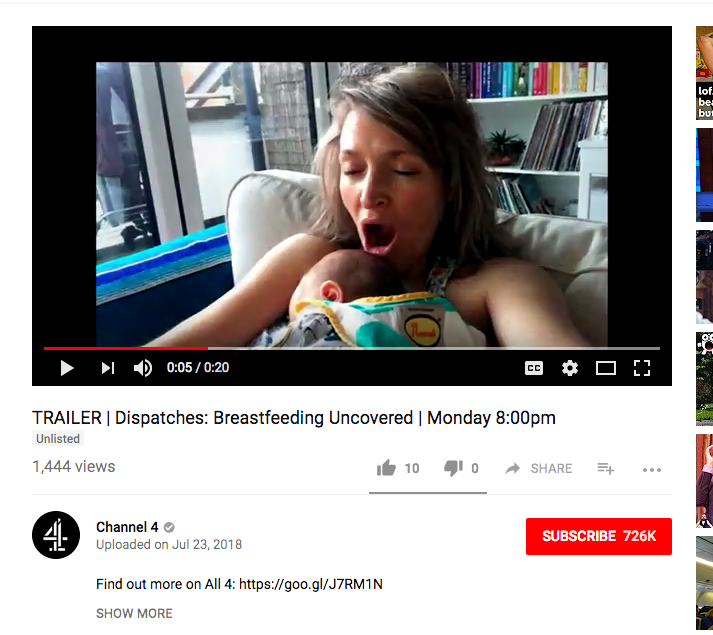CLICK HERE to watch Dispatches: Breastfeeding uncovered.
Broadcast on UK Channel 4 on Monday 30th July, 2018 and includes Baby Milk Action’s Policy Director, Patti Rundall being interviewed by Kate Quilton.
CLICK HERE for Blog posts on the UNICEF Baby Friendly Initiative website from Patti, Prof Amy Brown, Emma Pickett and Sue Ashmore
To join Baby Milk Action – click here.
To donate to support our work – click here.
Sign up for our campaign email alerts – click here.
There has been a great response to this program, especially on social media. But also some vitriolic attacks – one from Dr Ellie Cannon in the Mail on Sunday. Worth remembering our Press Release from 2016 – showing her links with Nestle and the SMA brand. Funny she didn’t mention that in the article. Here are some excerpts:
“Just because formula is manufactured – yes, processed – it doesn’t mean it’s unhealthy. Processed merely means ingredients have undergone a process (chopping a tomato is a process, as is heating soup).”… In fact, formula milk is more than a healthy choice, and recent additions to ingredients means it now contains more essential fatty acids and pre and probiotics –…

Campaign group finds at least 44% of local authority areas in England affected by recent cuts to breastfeeding services.
August 2018 UNICEF Baby Friendly Initiative Our new survey of health professionals across England highlights the urgent need for national leadership on infant feeding.
_________________________
Beware of dodgy research
A study that challenges the WHO/UK Government advice on breastfeeding duration, received much media coverage in July: CLICK here for a report in the Guardian (9.7.18): Feeding your baby solids early may help them sleep, study suggests. “An added benefit (of early introduction of solids) is that it seems to confer better sleep for the children,” said Gideon Lack, professor of paediatric allergy at King’s College London, and a co-author of the research.
..The media coverage implies that the challenge is based on new evidence. In fact this is not a new scientific study nor a systematic review, but the authors review of selected past research, published in the ‘Analysis’ section of the BMJ.
Three of the four authors of the piece, Mary Fewtrell, Alan Lucas and David Wilson, receive funding from the baby food industry. The baby food industry marketing strategy is to encourage parents to move onto processed foods, rather than family foods, and promoting their introduction before 6 months generally requires feeding purees and paps, which parents are less likely to home prepare. The risks of early introduction of complementary foods have been known for many years, with the World Health Assembly adopting a Resolution in 1994 saying that complementary feeding should be fostered from 6 months (rather than 4-6 months).
UK Policy on 6 month Exclusive Breastfeeding
The UK government commissioned a substantial review on this question with the Scientific Advisory Committee on Nutrition (SACN) did a risk assessment. They concluded that there was insufficient data to support the existence of a “window of opportunity” for the introduction of peanut before six months of age. Evidence that the introduction of hen’s egg before six months might be beneficial was limited and derived from RCTs where participants were not representative of the general population. The benefit risk assessment indicated that there were insufficient data to demonstrate that the introduction of peanut or hen’s egg into the infant diet between four and six months of age reduced the risk of developing food allergy to any greater extent than introduction from around six months.
https://cot.food.gov.uk/sites/default/files/jointsacncotallergystatementfinal2.pdf
